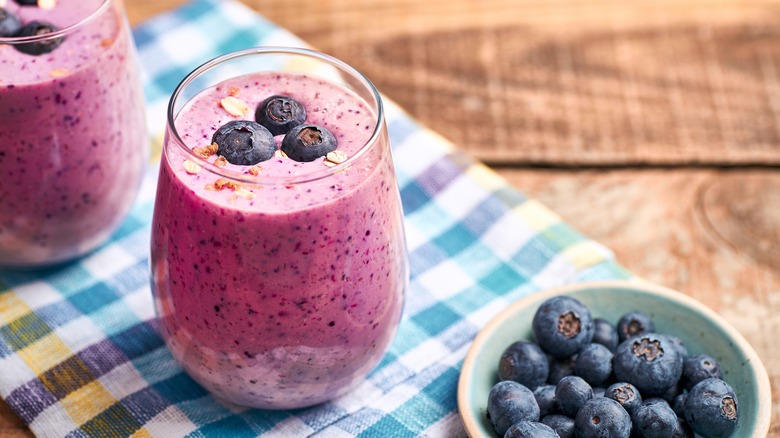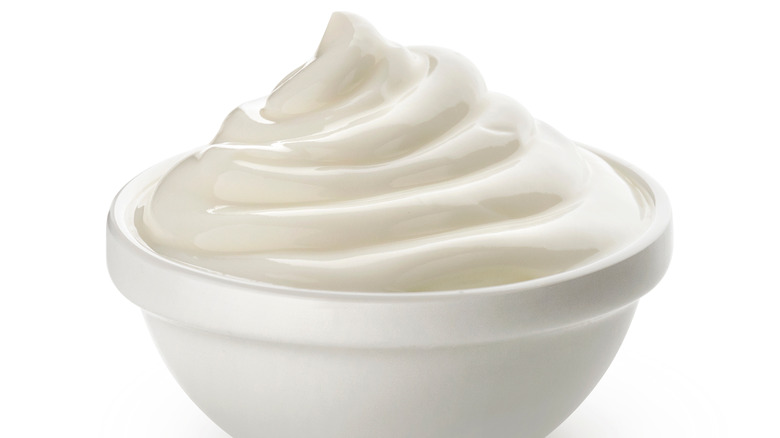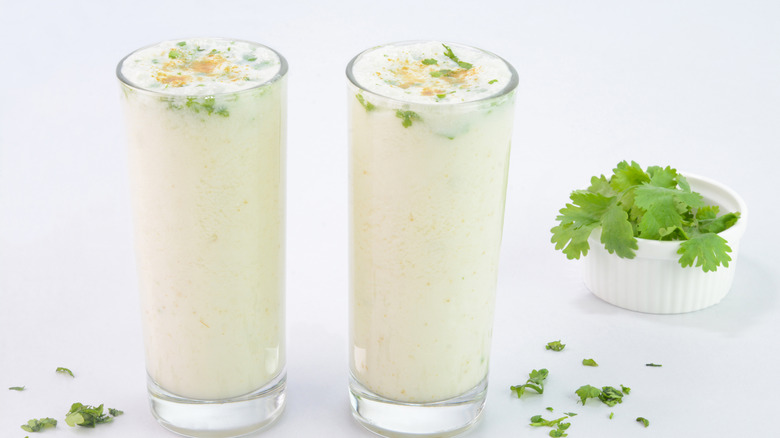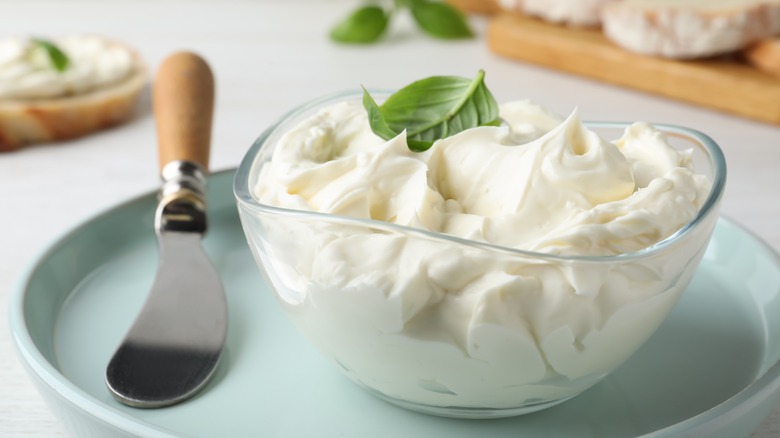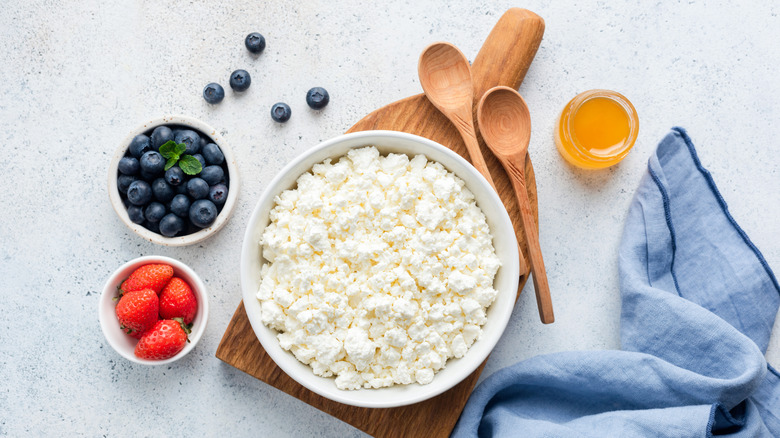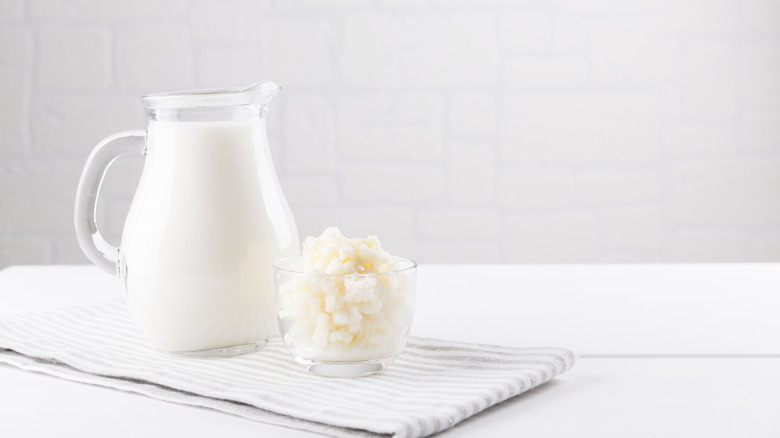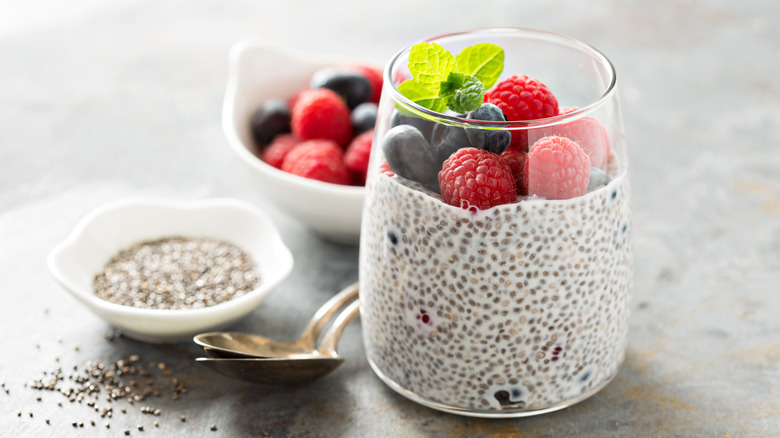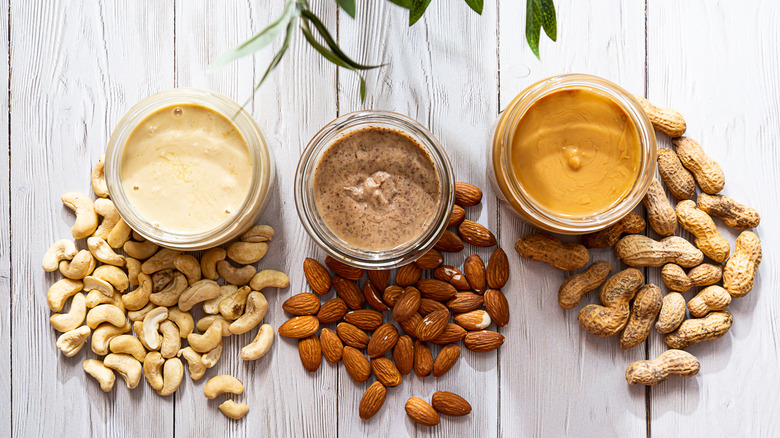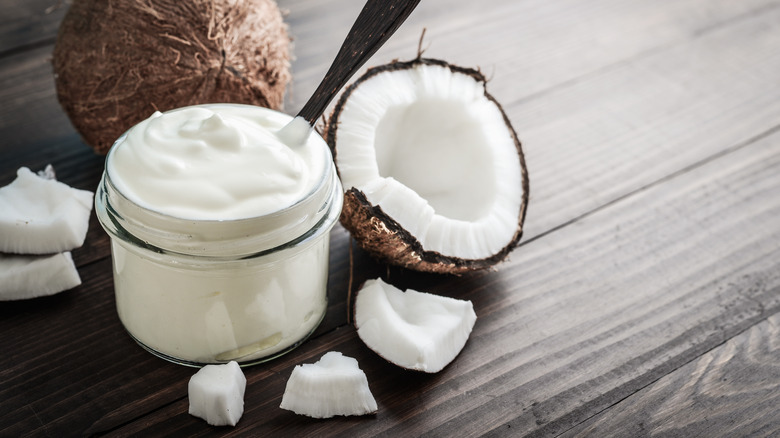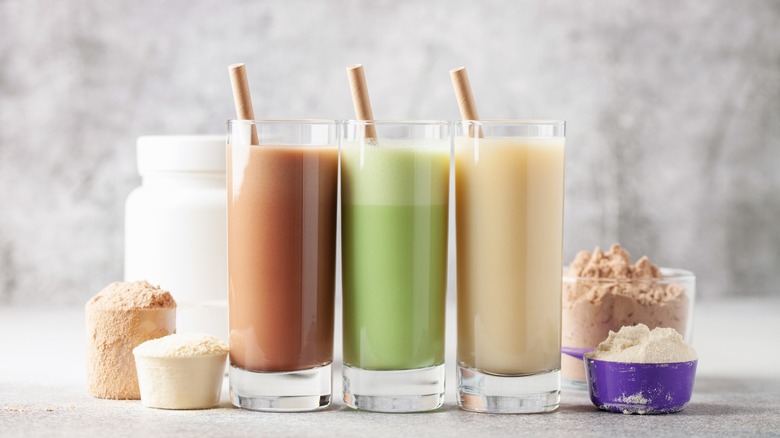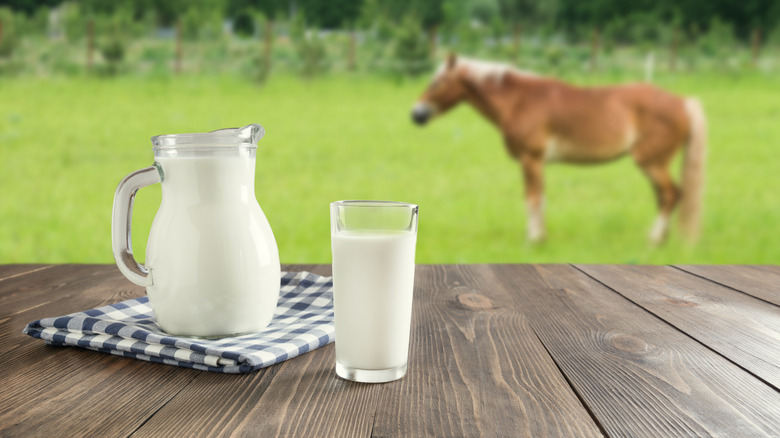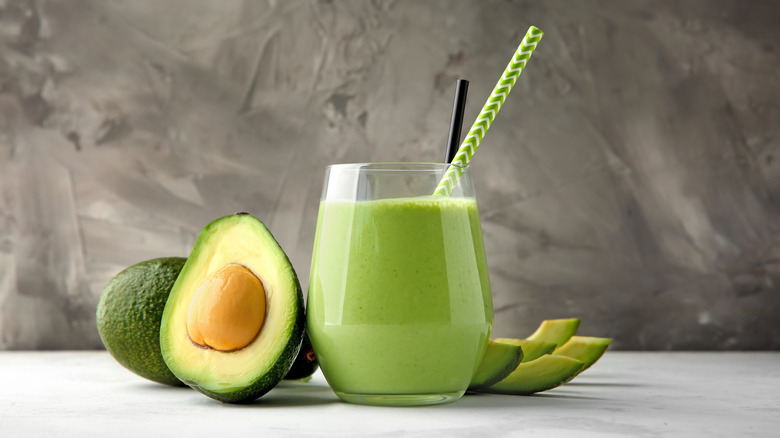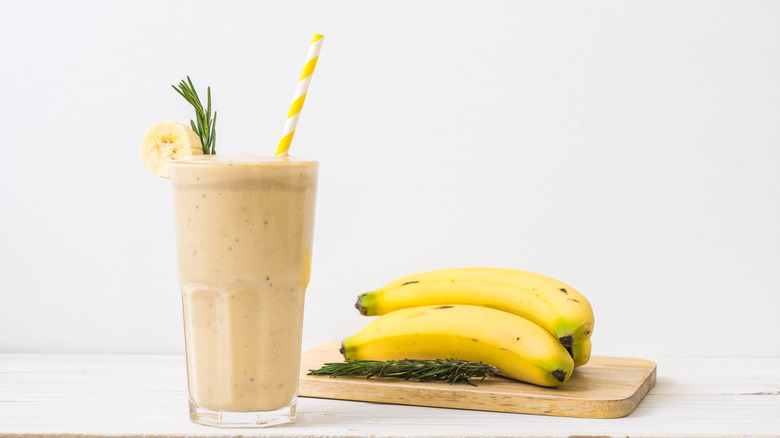The Best Yogurt Substitutes For Your Next Smoothie
Whether it's Greek, low in fat, or free from lactose, yogurt is one of the most popular ingredients to include in your favorite smoothies. One moment it's used to add a slightly tangy flavor, and the next, it's utilized as a thickening assistant. Yogurt is also known for its nutritional benefits like probiotics and protein (via Healthline).
On another note, yogurt has its downsides, such as its inaccessibility for those who are lactose-intolerant and vegan. Along with that downside, The Oregonian writes that smoothies purchased at a store and even at a smoothie shop can contain yogurt with refined sugars. If any of these are considered dealbreakers to you, you may be wondering how to bust up the relationship between yogurt and smoothies. Right now, it may seem nearly impossible to blend smoothies without yogurt. However, plenty of thickeners, dairy products, and other ingredients will help you make smoothies taste just as good as those with yogurt and provide more nutritional benefits while doing so.
Sour cream
There's a chance you haven't thought about using sour cream as a yogurt replacement before because of the word "sour." Don't judge an ingredient by its name because sour cream is actually a sweet choice for your next smoothie. Since yogurt also has that faint tangy taste, both can blend well with fruit, vegetables, and other options you prefer to use. Sour cream and yogurt share common ground since they're both fermented. The main difference between the two is that sour cream is a fermented dairy cream, while yogurt is a type of fermented milk.
Our Everyday Life explains that the main reason why sour cream is a good Greek yogurt substitute is that they share the same creamy texture that helps thicken smoothies. One cup of sour cream for your smoothie is equivalent to one cup of yogurt, making the dairy product easily replaceable. Sour cream also makes for a decent keto alternative to yogurt as it's high in fats and low in carbs. The flavor might be on the tangier side, but if you prefer your smoothies not to smack of sweetness, then sour cream is the substitute for you.
Buttermilk
The ingredient may start with the letter "B," but it gets an "A" for being a great substitute for yogurt. Foodstruct explains that buttermilk has many similarities to yogurt and their main differences have to do with their nutritional benefits. Buttermilk has many advantages over yogurt as it has more calcium, vitamin A, and vitamin C. This type of milk also includes fewer calories than yogurt. Buttermilk may have more carbs and fats than yogurt, but this can be considered a benefit if you drink smoothies as a meal replacement, especially if mixed with other ingredients high in protein that sustain your hunger.
The flavor of buttermilk also mirrors yogurt since it has that slightly sour taste and a thicker texture than regular milk. You may mostly use buttermilk to bake sweet treats, but it can be utilized for sweet drinks too. If you don't know what to do with leftover buttermilk, consider using it as a yogurt replacement for your next smoothie.
Cream cheese
Here is a type of soft cheese spread that's another alternative to yogurt and which will not make a difference in your smoothies. Cream cheese and yogurt both have a similar creamy consistency that is especially useful to make your smoothies thick. In particular, cream cheese is an even thicker alternative than something like heavy cream. One cream cheese hack can serve as an excellent trick if you love a dense yet smooth texture in your beverage. While normally a heavy cream substitute that tastes like the real thing, combining cream cheese with a touch of regular milk will easily replace yogurt in smoothies. The milk will soften the cream cheese and make it easier to work with, and it will also make the taste more placid as well, balancing a spread that can often be sweeter.
Although Greek yogurt has more protein and nutritional value overall, cream cheese does have a few benefits. For example, cream cheese has more iron than yogurt, which is a specific kind of protein that assists your red blood cells in carrying oxygen throughout your body from the lungs (via Harvard School of Public Health).
If you have cream cheese left over from making a breakfast bagel for breakfast — or from making cream cheese frosting for your dessert — use it for a smoothie whenever you get thirsty.
Cottage cheese
Next up in the family of dairy replacements for yogurt in a smoothie is cottage cheese. Since cottage cheese is commonly enjoyed with different fruits, why not add some to your next smoothie? Medical News Today notes that cottage cheese is high in calcium and vitamin A, similar to yogurt. Cottage cheese is also considered a strong protein source as it has 23.6 grams.
Cottage cheese might be a great way to gain protein without having additional sugar, but some have turned away from it due to the chunky, curdy texture. On another note, cottage cheese is sweeter than yogurt, and the texture will become more pleasant once blended into your smoothie. After that, cottage cheese will have a complete makeover as the curds will disintegrate and appear velvety thickbut within your smoothie. Utilizing fresh fruit into the mix will make the smoothie even sweeter and have a similar consistency as a blend that includes yogurt.
Kefir
Kefir is fermented milk with a consistency that's similar to the drinkable yogurts you would find at the grocery store. If anything, you can consider kefir as an adult version since it has alcohol content (although it's quite low). Kefir is described to have a tart taste that goes well with fruits (in this case, fruit smoothies especially) as it provides a complementing, acidic balance. Additionally, kefir has many similarities to yogurt in terms of how it is used in smoothies and the nutrients it provides. In that way, Healthline explains that kefir outruns yogurt in multiple races.
Kefir contains more protein, calcium, and probiotics than yogurt. Kefir also has less sugar in comparison. Those with lactose intolerance can't consume many kinds of milk and yogurt. As for kefir, a study conducted in the Journal of the American Dietetic Association revealed that some people with lactose intolerance gained better lactose digestion when consuming kefir. Although fermented milk may be better than regular milk in scientific experiments, it's important to know what your limits are if you're lactose intolerant.
Chia seed pudding
This unique type of pudding has all the great qualities of yogurt and more. Medical News Today explains that omega-3 fatty acids are present in chia seeds, reducing your risk of getting a heart attack and becoming obese. The seeds also contain a high amount of fiber which can lower your cholesterol levels and blood pressure, both conditions being some of the main influences of cardiovascular disease.
Besides the many nutritional benefits, chia pudding can have different consistencies depending on how it's made. Many recipes note that the pudding can be thin if you include too few chia seeds or too much liquid, or it can become gelatinous if you include a lot of chia or refrigerate it too much. As such, you can adjust your chia pudding accordingly based on the thickness of the smoothies you enjoy.
Regardless of how thick you want the chia seed pudding to be for your smoothie, you must never use raw seeds. According to WebMD, chia seeds expand once they come into contact with liquid and could become a life-threatening obstacle in your esophagus. Mix the seeds in a bowl of water and let them enlarge before you make the pudding.
Nut butter
Butter usually isn't a healthy option for most foods and drinks; however, nut butter is one of the exceptions. Cedars-Sinai Hospital explains that nut butter has many nutritional benefits, such as protein and fiber that will help satisfy your hunger. Nut butter can also add a dose of heart-healthy fats to your smoothie, especially in our healthy vegetable and fruit smoothie recipe. One note here is that not all kinds of nut butter are the same, and there are a lot of nutritional differences between them.
If you're looking for a yogurt substitute with omega-3 fatty acids but aren't a fan of the very unique texture of chia seeds, walnut butter is your best choice. Do you think extra creamy smoothies are the best? Use cashew butter since texturally, it can be used as a replacement for cream and milk in any recipe. Are you allergic to tree nuts? Don't worry because a paste made from sunflower seeds can provide you with as much protein as the other types of nut butter. The classic option of using peanut butter is a win-win scenario for everyone (unless you're allergic to peanuts, of course). Peanut butter is the most affordable and has the most protein. Other nut butter variations like almond and hazelnut butter are also great options to use in smoothies as they pack more flavor than the average yogurt.
Coconut cream
Some may not think coconut cream is the best option to replace yogurt in smoothies because it has high calories and fats. However, WebMD emphasizes that coconut cream has a good amount of vitamins and minerals. Coconut cream is described as a strong source of potassium, which helps relieve fatigue, high blood pressure, muscle cramps, and salt sensitivity. The cream also can improve your cholesterol, reduce your chances of having heart disease, and rescue your stomach lining from potential irritants.
Coconut cream is loved for its creamy texture, which is thicker than its milk counterpart. The consistency and its rich taste make coconut cream stand out even compared to other creams that are heavy in dairy. Since this type of cream can triumph over its competitors in the nutrition profile category, it's no surprise that it also has a high chance of winning in the smoothie department. Many people, especially those in favor of plant-based milk alternatives, already use coconut milk in their smoothies. Take this as your signal to start doing so as well.
Protein powder
You might be used to employing powders for high-protein shakes, but it is also a beneficial option to use in smoothies and is a strong replacement for yogurt — literally. You no longer have to rely on yogurt for an intake of calcium to build your muscles should you decide to start adding protein powder to your next smoothie.
If you're lactose intolerant, protein powders (with the exception of whey powders) won't keep you from enjoying smoothies as they don't contain dairy, unlike yogurt. Some people use smoothies as meal replacements due to their large calorie intakes. However, this isn't recommended if the smoothies don't contain enough protein. Protein powders will solve that problem since they will help your blended drinks develop a more fulfilling nutritional profile while curbing hunger.
Protein powders have a variety of flavors that can make for some great combinations with your other smoothie ingredients. If you want a vegan-accessible protein powder with more nutritional benefits and a taste similar to vanilla yogurt, brands like Vega Sport Premium Protein have covered you.
Soy milk
Dairy alternatives derived from soybeans are a great alternative to milk and yogurt for smoothies. According to nutrition information accrued from the USDA, the data on soy milk shows that this alternative has significantly less saturated fats in comparison to yogurt. Soy milk contains 0.21 grams of saturated fat per 100 grams, while the USDA data shows that yogurt has 2.1 grams. Soy milk also tops yogurt by including more vitamin B12 and niacin, another vitamin that helps your digestive and nervous system. Niacin is also the source behind how food turns into energy in your body, according to Mayo Clinic. Yogurt loses the calorie battle by containing 61 per 100 gram serving, while soy milk carries 43 calories.
Another benefit that soy milk has over yogurt is its taste. Many prefer soy milk over defaulting to dairy milk because it has a higher amount of sweetness which will stand out more than the slightly acidic flavor yogurt can have. Soy milk is also an effective ingredient to use when you want to reduce the environmental impact of your diet, as soy ranks high on the list of sustainable plant-based milks.
Koumiss
Similar to kefir, koumiss is fermented milk that's a good replacement for yogurt in smoothies. Koumiss and kefir are often thought to be the same ingredient since they both are made from milk and contain low alcohol levels. However, a research journal called Yogurt in Health and Disease Prevention notes that these fermented milk are manufactured with different methods and have unique product characteristics. Additionally, the journal explains that koumiss is made from mares' milk while kefir can be produced from either cow or goat milk.
Koumiss may have bitter notes compared to yogurt, but it has a slightly sweet aftertaste that will help your smoothies develop balanced and complex flavors. The fermented milk also includes many nutritional benefits, such as high levels of vitamin C, an exceptionally large amount of probiotics, and antifungal and antibiotic attributes (via Annual Research & Review in Biology). Nevertheless, the Science of Beverages reports that koumiss has an incredibly high amount of lactose to the point it can be used as a laxative. If you want to avoid those unsavory effects or prefer not to consume products with even mild alcohol, consider other options to replace yogurt in your smoothies.
Avocados
Avocados are a common ingredient used in smoothies, but have you thought about using them as a yogurt replacement? Probably not. These warm-weather fruits can improve the functions of the digestive system and your mental health, thanks to a high folate level, which has been linked to reducing the risk of depression (via Medical News Today). And, avocados can even act as a detoxing agent thanks to high levels of fiber and contribution to a healthy gut microbiome. Avocados include other great qualities like having high amounts of fatty acids. They also contain the majority of vitamins necessary for your body, like vitamins A, C, and K. All of this, plus the fact that this fruit has low sugar and high iron content, means it is a much more nutritious addition to smoothies than yogurt.
The fruit is also a great substitute because they have that creamy, rich texture that many love using yogurt for. Not to mention, avocados can be used as a great thickener. Make sure to blend avocados well with other smoothie ingredients if you dislike their taste. Other fruits, nuts, and even chocolate are some options that can help distract you from the avocado's taste.
Bananas
When you think about smoothies, most of the ones that first come to your mind will likely include bananas. From the iconic strawberry-banana duo to our mango banana smoothie recipe, you can't go wrong with any kind of banana smoothie — unless you're allergic to them, of course. Bananas are so beneficial to smoothies that they don't need to rely on yogurt to enhance their thickness.
Making sure you maintain the best quality of bananas is the key to making your next smoothie successful without yogurt. Avoid buying and using browning and unripe bananas if you want to have the highest quality visually and in terms of flavor. If you have spotting bananas, don't give up on them. Freeze the fruit so it doesn't ripen any further and can have a chance to thicken your smoothie the way you want (this technique also works if your bananas are completely yellow or if the spots make you feel uncomfortable).
Bananas have that nice, sweet taste that's perfect for smoothies. On another note, try to limit the number of bananas you're blending in your smoothie, as this fruit is naturally high in sugar. Too much of any ingredient can become an issue if you don't track the nutritional facts. Smoothies may be one of the most wholesome beverages on the planet, but always remember to measure any yogurt substitute you include if you want them to keep their many nutritional benefits.
